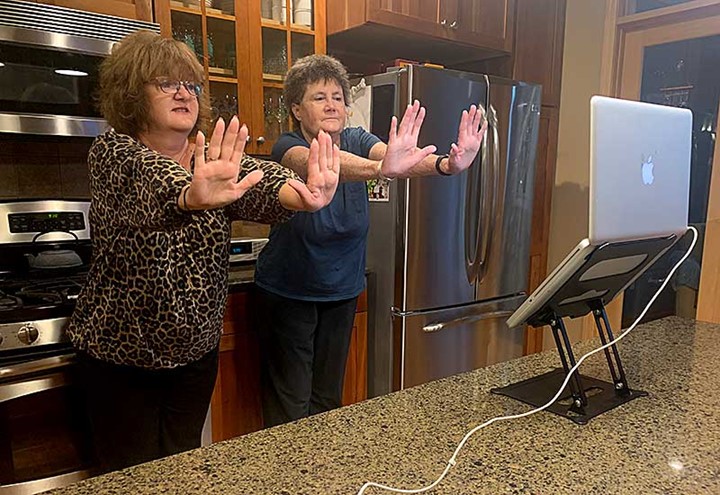Fear of falling has kept Patti Ihrke of Stillwater, MN, from enjoying outdoor walks and activities. Diagnosed with lupus in 1974, her bones have become brittle. Medications and low blood sugar cause dizziness that makes her unstable on her feet.

“I’ve done a lot of physical therapy to help me walk well,” Patti said. “It’s not that I don’t have enough strength; I just know that if something distracts me and I lose my balance, I could fall.”
For almost a decade, fear of falling has kept Patti Ihrke of Stillwater, MN, from enjoying outdoor walks and activities. Anti-rejection drugs from two kidney transplants and low blood sugar stemming from diabetes also play a role, causing dizziness that makes her unstable on her feet.
Facing the fear of falling
After five falls, a broken femur, a broken leg and broken ribs, Patti is in search of ways to feel more in balance and stable on her feet, and she’s finding guidance in a Juniper class. She’s also tapping into resources provided by the National Council on Aging (NCOA). Acknowledging her fear was a critical first step to keeping Patti on her feet, and now she’s discovering tangible strategies for finding balance amid dizziness and maneuvering her way to a place of safety.
Assessing the risk
Patti began by assessing her risk of falling with NCOA’s Falls Free Check-Up. Answering “yes” to four or more of 12 questions on the quiz means you’re at risk for falling. Patti said “yes” to eight. After taking this test, Patti received a link to a list of resources and videos from NCOA on how to reduce her risk of falls and the following guidelines:
6 Steps to Prevent a Fall
- Find a good balance and exercise program
Look to build balance, strength and flexibility. You can also contact your local area agency on aging for referrals. Find a program you like and take a friend.
Patti chose the Tai Ji Quan: Moving for Better Balance class, available through Juniper because the movements are slow, don’t involve a lot of bending, and if necessary, she can do the movements from a sitting position. She is currently taking the class online from her home.
The value of this class was clear to Patti after one session. She said, “I learned the importance of posture for good balance. I now realize that standing up straight with shoulders back and my head up straight is at the core of balance.” Patti shared this example, “In the past, when I took a shower, seated on my bench, I would put my head down and roll my shoulders forward to soap up. As a result, pain would shoot up my neck and give me a headache. Now, I’m cognoscente of keeping my head aligned with my shoulders when I bend down, to prevent pain. This is huge for me!” And when it comes to walking, Patti now realizes she can look ahead for tripping hazards with her head up, instead of looking down.
Patti says the Tai Ji Quan class is stress-free because Instructor Rebekah Reynolds with Juniper partner, A.C.E. of Southwest Minnesota, conducts it with a very calming voice. “She makes me feel relaxed. And, she taught me that keeping my shoulders back and head up gives my body more space to breathe.”
- Talk to your health care provider
Share the results of your Falls Free Check-up, and your history of falling.
An MRI revealed that there is nothing neurological keeping Patti from walking outdoors; just dizziness and fear of distracting sights and sounds that divert her focus from tripping hazards. She says, “Tai Ji Quan is also helping me with this.”
- Regularly review your medications with your doctor or pharmacist
Make sure side effects aren’t increasing your risk of falling. Take medications only as prescribed.
Patti knows the medications she takes can cause dizziness, along with the low blood sugar that can occur from her diabetes. Due to the fact that she can’t change her medications or the side effects of diabetes, she is learning how to work through it, and prevent falls.
- Get your vision and hearing checked annually, and update your eyeglasses
Your eyes and ears are key to keeping you on your feet.
Patti gets her eyes checked every year, but not her hearing. Since ear problems could be adding to her dizziness, she’s going to get her hearing checked.
- Keep your home safe
Remove tripping hazards, increase lighting, make stairs safe, and install grab bars in key areas.
Realizing that there are tripping hazards in her home, Patti removed throw rugs and moved a few things around. She also remodeled her shower and installed grab bars and a bench.
- Talk to your family members
Enlist their support in taking simple steps to stay safe. Falls are not just an issue for older adults.
In Patti’s case, she talked to a friend, who directed her to Juniper, giving her access to helpful resources, and they’re taking the Tai Ji Quan class together!
Avoidance of physical activities due to a fear of falling can become a self-fulfilling prophecy, and lack of activity can lead to loss of physical skills and an increased risk of falls. Patti Ihrke now realizes this and is facing her fears, recognizing her risk, addressing her concerns and taking steps towards staying on her feet. Kudos to you, Patti!
Juniper specialists are available to answer your questions by phone at 855-215-2174. And, if you feel you would benefit, find an upcoming Tai Ji Quan class.